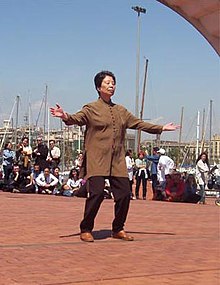Qigong
![]()
The title of this article is ambiguous. For other meanings, see Qigong (disambiguation).
![]()
This article or subsequent section is not sufficiently supported by evidence (e.g., anecdotal evidence). Information without sufficient evidence may be removed in the near future. Please help Wikipedia by researching the information and adding good supporting evidence.
The entire text is unsubstantiated in its individual statements/assertions.
Qigong (Chinese 氣功 / 气功, Pinyin qìgōng, W.-G. ch'i-kung), in common German spelling also Chigong, is a Chinese form of meditation, concentration and movement for the cultivation of body and mind. It also includes martial arts exercises. The practice includes breathing exercises, physical and movement exercises, concentration exercises and meditation exercises. The exercises are intended to harmonize and regulate the flow of qi in the body.
The origin of the exercises lies far back, already in Zhuangzi certain forms are hinted at, and from the time of the Han Dynasty silk paintings are available. The name Qigong was used for the first time by the Daoist Xu Xun from the Jin period and has since then referred to certain exercises in martial arts. In the history of China this practice has always played an important role as health care, but was also used for religious-spiritual purposes, especially in Daoism, Buddhism and Confucianism, and was handed down in the monasteries. However, the name Qigong for these exercises has only been used since the 1950s and the different styles of Qigong are partly quite new developments, which are, however, based on the millennia-old traditions.
In the 1950s, the name Qigong was used for these health exercises by the physician Liu Guizhen, who used techniques of ancient tradition to promote and stabilize the energy balance of the body and to treat diseases.

Qigong exercise
Etymology
"Qi" (pronounced similarly to "tchi", in Japanese and Korean "ki") in Chinese philosophy and medicine stands for both the moving and vital force of the body, but also of the entire world. In the Chinese language it has the meaning of breath, energy and fluid. The term encompasses many forms and modes of action. "Gong" as a Chinese term means "work" on the one hand, but also "ability" or "skill". Thus, Qigong can be translated as "constant work on Qi", or also as "ability, skill to deal with Qi, to use it".
The practice of Qigong is intended to strengthen the life energy in order to achieve a healthy physical and mental condition and thus prolong life.
See also: Panzi Gong
Qigong as a method of treatment
In the inpatient treatment of mentally ill patients, Qigong exercises are increasingly used as a non-verbal, accompanying therapy method.
Qigong improved the quality of life of women undergoing radiation therapy for breast cancer in a randomized controlled trial.
Qigong as an additional home exercise in a pulmonary rehabilitation program: the analysis identified improvement trends in all participants in the qigong group, while lower improvements and worsening trends were found in the control group.

Danube Delta Biosphere Reserve, satellite image 2000

In the Danube Delta, 2008

In the Danube Delta, 2005
Search within the encyclopedia